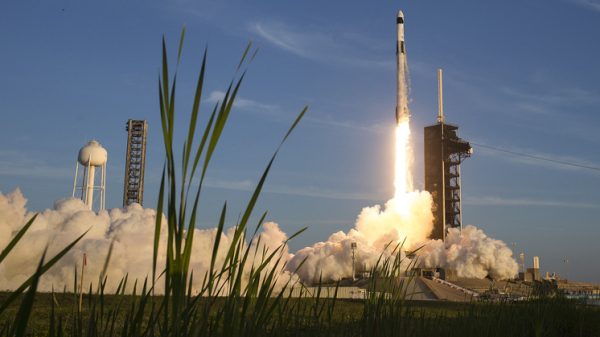 Ukrainian soldiers near Kharkov fire artillery towards the Russian border. Photo: Jose Colon/Anadolu via Getty
Ukrainian soldiers near Kharkov fire artillery towards the Russian border. Photo: Jose Colon/Anadolu via Getty
For months, Mikhail and his comrade Alexander felt that the West had forced Ukraine to fight with its hand tied behind its back.
Restrictions on the use of Western-supplied weapons inside Russia meant that Ukrainian forces could see Moscow's forces grouping or preparing to attack, but were unable to respond.
“If the Russians use their weapons on our territory, then it should be fair: we should be able to strike at their territory,” says Alexander from the 71st Jaeger Brigade of the Ukrainian army, who declined to give his full name.
«That doesn't mean we're going to use these weapons against civilian targets, only against military targets.»
His comrade, a former miner from Lviv, who was shell-shocked by artillery shelling twice in more than two years at the front, said: “Before, it was unfair. Our intelligence tells us the coordinates of Russian targets, but we have not been able to hit them.”
Speaking to The Telegraph on Tuesday, troops from the Volchansky Front northeast of Kharkov were unanimous that Joe Biden had now made the right call decision, albeit belatedly, granting Ukraine limited permission to use American weapons to strike Russia.
Kyiv, which is severely outgunned and outnumbered on the battlefield, has begged Washington to allow it to hit targets on Russian soil with American-made weapons.
Soldiers fighting for Volchansk, which was largely destroyed in a renewed Russian attack on the Kharkiv region three weeks ago, said Ukrainian commanders knew where key targets were located across the border. But they were unable to strike them.
When Russian troops invaded the region in May, Ukraine was unable to disperse the troop concentration or conduct effective counter-battery fire because the attack came from across the border.
Strikes at supply chains, air bases, artillery The military forecasts that the troop build-up will seriously hamper Russia's attempts to advance deeper into Kharkov.
“The main thing we need to do is break their supply chains,” Alexander said.
< img src="/wp-content/uploads/2024/06/0280beded89b0179f2d843ef4bd1217d.jpg" />
In Tuesday, the head of the administration of Ukrainian President Vladimir Zelensky supported the opinion of the front line.
Andriy Ermak said that the change in policy will help repel a Russian offensive, repel air attacks and better protect the territory in the Kharkov region.
He said: “Permission to use Western weapons on the territory of the Russian Federation is a vital decision.”
“It will impact the conduct of the war, counteroffensive planning and weaken the Russians' ability to use their forces in border areas.”
Biden bowed to pressure last week to ease restrictions that US officials had previously considered necessary to prevent America and NATO from being drawn into a broader conflict with Russia.
A growing number of European countries include the UK and Russia. France has already given Kyiv permission to use Western missiles against Russian military targets even before they crossed the border.

Jens Stoltenberg, the head of NATO, also applied rare diplomatic pressure to the White House, saying that «in light of the way this war has unfolded, it is time to look at some of these restrictions to allow Ukrainians to truly defend themselves.»
US officials later said Biden authorized US weapons for «counter-fire purposes in Kharkov so that Ukraine can retaliate against Russian forces that are striking or preparing to strike.»
That's true. It has since been reported that Ukraine has launched attacks using US-supplied Himars missile batteries to hit targets inside Russia.
 Preparations for a 120-mm mortar attack on Russian positions in Donetsk Photo: Oleg Petrasyuk/AP
Preparations for a 120-mm mortar attack on Russian positions in Donetsk Photo: Oleg Petrasyuk/AP
Rockets are reported to have destroyed the air defense complex in the Russian city of Belgorod, equipped with S-300/400 surface-to-air missiles on Sunday.< /p>
The Kremlin later warned Washington that supporting cross-border attacks could have “fatal consequences.”< /p>
“We can finally push them back a little,” one infantry soldier told The Telegraph.< /p>
“Maybe this will give us a break. It's very frustrating.”
Another said: “Yes, we should be able to hit them. We didn’t invade them, they invaded us.”
The troops described difficult conditions at the front. They said that although ammunition had begun to arrive at their positions after a long political delay in supplies from the United States, Ukrainian forces were still vastly outgunned.
“We need to kill the Russians.”
“If we use 10 rounds, they are sending 50 back,” said one artilleryman.
«Even if we get shells, our artillery barrels are old and worn out.»
He predicted that permission to strike inside Russia would help, although he said cross-border strikes would likely be a tiny fraction of Ukraine's overall attacks.
He said: «Of course they should give us that capability. We won't use it against civilians, we'll use it against military targets.»
«We need to kill Russians so they don't come here.»
Volchansk has been largely destroyed since the offensive began on May 10.
Up to 80 percent of the city's buildings were reported to have been damaged.
Troops said the front line had stabilized in recent days and Ukrainian commanders estimate they still control 70 percent of the city.
Troops still face the threat of superior Russian artillery and glide bombs that could be launched by Russian aircraft far beyond the range of Ukrainian air defenses.
Mikhail said the ammunition shortage had eased with the US supply being unblocked.
He said: “Of course it was very painful at the end of 2023. Now we can use artillery. It is impossible to fight with infantry alone.
“If our allies also continue to supply more, then we will be able to save more Ukrainian lives.”
The cost of more than two years of Russian invasion is evident at Cemetery No. 18 in Kharkov . One section contains about 1,200 new graves, covered in a sea of national and military flags.























































Свежие комментарии